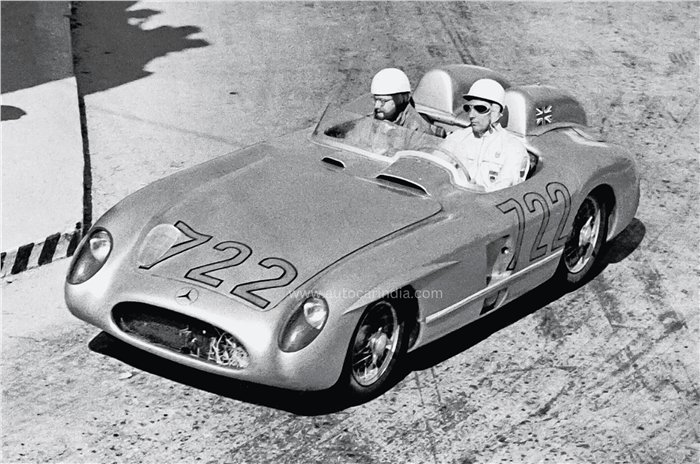The 300 SLR Uhlenhaut and Moss’ 300 SLR can be considered the ultimate 300s, for their monetary value and heritage. We walk you through their history.
Which is the ultimate 300? If you are a classic car or a Mercedes-Benz enthusiast, chances are that your ultimate 300 would either be the Euro 135 million 300 SLR Uhlenhaut Coupé (see box) or the 300 SLR ‘722’ (W 196 S). The latter race car was driven by Sir Stirling Moss on May 1, 1955, and won the Mille Miglia, the famous 1000-mile (1,600km) race across Italy (from Brescia to Rome and back) alongside co-driver Denis Jenkinson.
The car’s race number was 722, denoting the 7:22am flag-off time. Moss and Jenkinson completed the gruelling challenge in 10 hours, 7 minutes and 48 seconds, averaging a speed of 97.96 miles per hour (about 158kph)! The British racing legend finished over half an hour ahead of Juan Manuel Fangio, who completed the race (without a navigator) in 10 hours, 39 minutes and 33 seconds, also driving a 300 SLR. Moss’ record still stands.
Sir Stirling Moss and Denis Jenkinson winning the 1955 Mille Miglia in the now iconic ‘722’.
Moss said in one of his interviews, “Certainly [this was] my greatest win. I can’t think of any other car in the world that would have given me the opportunity of achieving [the] speeds we did.”
The story goes that Mercedes-Benz left no stone unturned whilst developing and building the 300 SLR for the 1955 Mille Miglia. The team’s mechanics assessed the car’s wear and tear after every practice run to ensure minimal chances of failure during the race. It is believed that one of the prototype cars completed the equivalent of six Mille Miglias, with all four works drivers – Stirling Moss, Juan Manuel Fangio, Karl Kling and Hans Herrmann – testing it to its very limit over pot-holed mountain roads. “The greatest car, in my mind, was the 300 SLR,” said Moss in an interview with ESPN in 2012.
The iconic 722 was powered by a 3.0-litre straight-eight that could produce over 300hp and had a top speed of over 274kph. The car’s engine was a technological marvel as it boasted of direct fuel injection and desmodromic valves, which use cams and actuators instead of return springs to avoid valve ‘float’ and loss of performance at high rpms.
The 1955 Mille Miglia win made the Mercedes-Benz 300 SLR ‘722’ and Sir Stirling Moss legends, and the ‘722’ is now at its permanent home in the Mercedes-Benz Museum in Stuttgart. Its price? It’s impossible to put a price tag on something so rare and precious. It’s essentially a piece of automotive history that should be preserved for future generations. Like art, this one’s priceless.
World’s most valuable car: 300 SLR Uhlenhaut
In 2022, RM Sotheby’s and Mercedes-Benz made history with the 300 SLR Uhlenhaut Coupé that sold at a record price of Euro 135 million (about Rs 1,266 crore).
.png&c=0&w=700)
This Uhlenhaut sold for €135 million.
The Uhlenhaut ‘Red Coupe’ – chassis no 196.110.00008/55 or ‘Number 8’ – was regularly used by the legendary chief engineer, Rudolf Uhlenhaut, himself. The Red Coupe was unique as only two Uhlenhaut Coupés were ever built; the other is known as the ‘Blue Coupe’. A masterpiece of automobile engineering and design, it isn’t surprising that it sold at a record price, making it the most valuable car in the world when you consider that so many collectors had unsuccessfully tried to acquire it in the past.
What makes the car so special is the combination of Mercedes-Benz’s motorsport history, timeless design and the highest levels of automobile engineering (the Uhlenhaut SLR Gullwing was based on the W196 R Grand Prix car), and it could reach speeds of 300kph in the 1950s.
Also see:





















.png&c=0&w=700)




